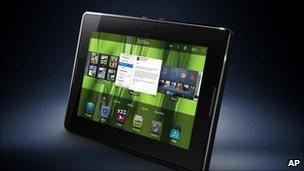Blackberry boss responds to Apple's tablet jibes
- Published

Blackberry will release its Playbook next year
One of the CEOs of Blackberry maker Research in Motion (RIM) has hit back at Apple chief Steve Jobs' critique of the tablet market.
On Monday, Mr Jobs said that a raft of 7in tablet-computers would be "dead on arrival" when they hit the market to take on Apple's iPad.
But RIM's Jim Balsillie said his comments do not make sense "outside of Apple's distortion field".
RIM has said that it will launch a 7in-tablet known as the Playbook in 2011.
"For those of us who live outside of Apple's distortion field, we know that 7" tablets will actually be a big portion of the market," Mr Balsillie said in a company blog post, external.
"And we know that Adobe Flash support actually matters to customers who want a real web experience".
Apple's iPad does not support Flash, software commonly used to add animation, video or interactive elements to a web page.
"We think many customers are getting tired of being told what to think by Apple," he wrote.
'Half truths'
He listed a number of reasons why he believed the 10-inch iPad would dominate over 7in rivals, including pricing, the availability of apps and the resolution of the screens.
"These are among the reasons we think the current crop of 7in tablets are going to be DOA, Dead on Arrival," he said.
"Their manufacturers will learn the painful lesson that their tablets are too small and increase the size next year, thereby abandoning both customers and developers who jumped on the seven-inch bandwagon with an orphan product. Sounds like lots of fun ahead".
Mr Balsillie also sought to counter Mr Jobs' assertion that the iPhone had outsold the Blackberry in its latest quarter.
RIM's last fiscal quarter ended on 28 August, while Apple's ended on 25 September.
"Industry demand in September is typically stronger than summer months," Mr Balsillie wrote, adding that the iPhone had not performed so well in the previous quarter.
RIM shipped 12.1 million Blackberrys in its last quarter. Apple said that it had sold 14.1 million iPhones.
"As usual, whether the subject is antennas, Flash or shipments, there is more to the story and sooner or later, even people inside the distortion field will begin to resent being told half a story," Mr Balsillie said.
During the call, Mr Jobs also took aim at Google's Android operating system, calling it "fragmented" and said Google was wrong to characterise the software as "open".
"Google loves to characterise Android as open, and iOS and iPhone as closed," he said. "We find this a bit disingenuous and clouding the real difference between our two approaches."
Google has not formally responded to Mr Jobs's comments. However, Android-creator Andy Rubint tweeted a seemingly cryptic message in response, external that resembled a string of symbols.
The message is the code that allows anyone to download and use Android.
Others have also criticised Mr Jobs tirade.
Iain Dodsworth, the developer of the Twitter client Tweetdeck, refuted Mr Jobs' assertion that "the multiple hardware and software iterations [of Android phones] present developers with a daunting challenge."
Mr Jobs said the firm had recently said "they had to contend with more than 100 different versions of Android software on 244 different handsets".
- Published27 September 2010
- Published16 September 2010
- Published28 May 2010